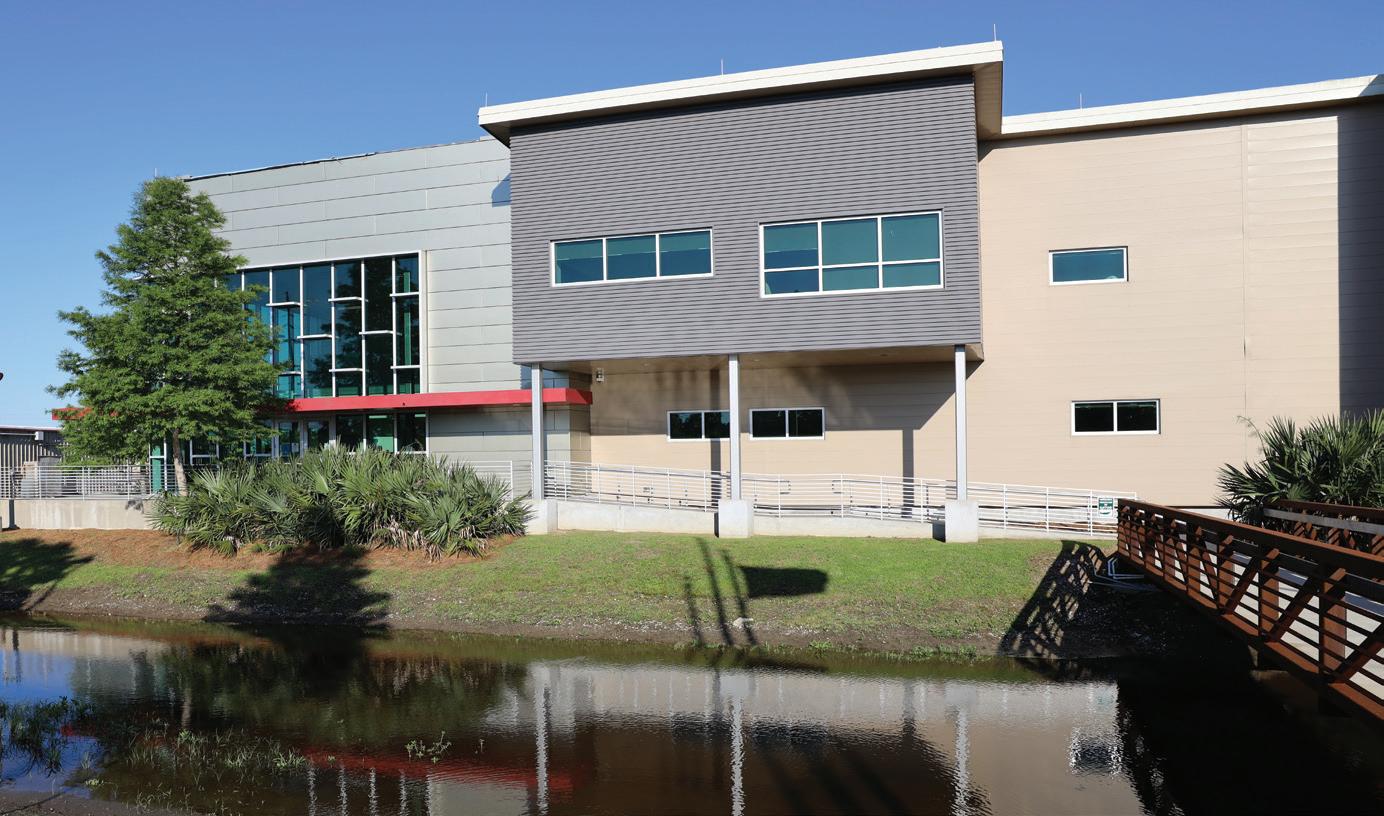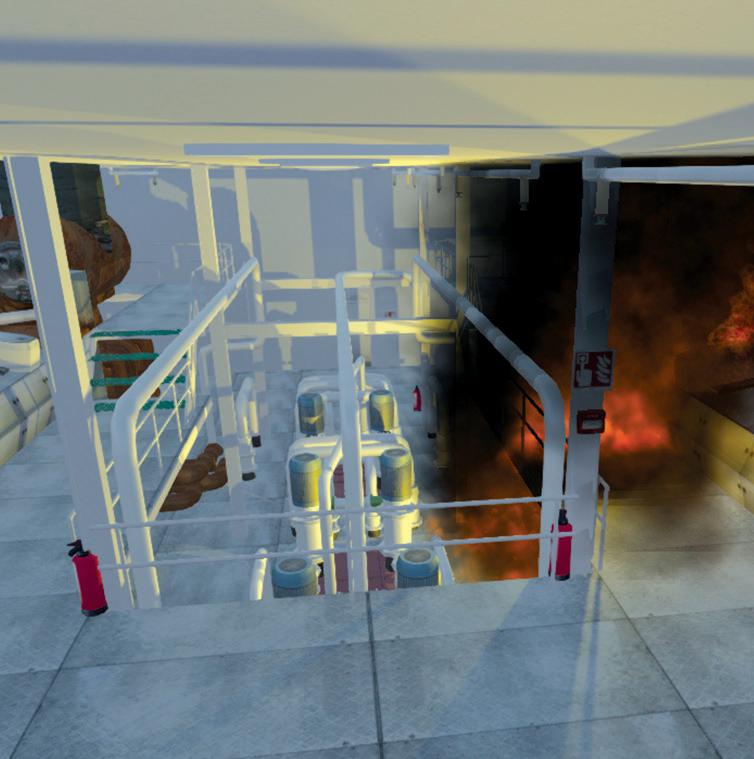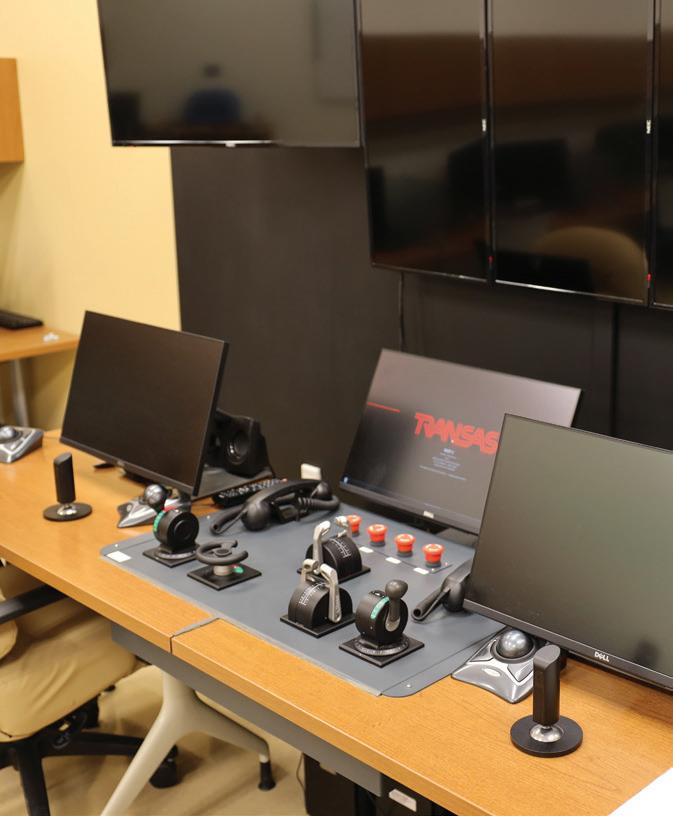
7 minute read
Vessel Report: Pressure Cooker
from WorkBoat July 2021
by WorkBoat
Pressure Cooker
College’s firefighting course puts mariners on the firing line.
By Ken Hocke, Senior Editor
In May, the Maritime Administration (Marad) named 27 Centers of Excellence for Domestic Maritime Workforce Training and Education (CoE). The CoE designation recognizes community colleges and training institutions that prepare students for careers in the U.S. maritime industry. These academic institutions are located in 16 states and one U.S. territory.
One of the CoEs, and the only one in Louisiana, is Delgado Community College. The New Orleans-based school boasts a state-of-the-art maritime training facility — the Delgado Maritime and Industrial Training Center.
Simulators at Delgado’s maritime center provide hands-on training to inland towboat, tug and
Delgado uses a number of simulators for its maritime workforce training.
offshore captains, and others.
VIRTUAL REALITY
Delgado’s newest training tool is its 32-hour, Coast Guard- and Standards of Training, Certification and Watchkeeping (STCW)-approved advanced firefighting course for those who already have taken the full basic firefighting course. The new course provides both classroom and an immersive experience using virtual reality simulation to prepare mariners in the inspection and maintenance of firefighting equipment and systems, as well as command and control of a fire situation with the final goal of extinguishment.
The course is conducted over a four-day period, utilizing classroom instruction and the Netherlands-based XVR Simulation’s training

software. The XVR virtual reality software for training maritime personnel in advanced firefighting has a built-in environment that simulates a vessel and all its spaces. The course instructor uses and controls pre-made fire situations in the program. Situations can range in size and scope from a small to raging onboard fire.
“Delgado has always looked at all avenues to expand our training to keep up with present and future competentbased courses to match job skills to job descriptions,” said Schwab. “With that being said, one program developed is XVR Virtual Reality simulation, designed for Coast Guard-approved advanced firefighting courses that match the job responsibility and the licensed position.”
The course’s main facilitator is Albert Faciane, a Delgado adjunct instructor for the past 18 years and a district fire chief for the New Orleans Fire Department, where he has worked for the past 29 years.
“XVR On Scene (module) is a 3-D virtual reality simulation training platform that allows training institutions like ours to design, customize, and present to our students an immersive and dynamic training experience that allows each exercise to evolve uniquely for each participant,” said Faciane. “With XVR, we can virtually place our students anywhere, on a variety of vessels, within a near limitless array of emergencies. From fires, hazardous materials release, or man overboard, XVR provides the flexibility of development and implementation to meet the safety training needs of our clients.”
“This training is especially useful for captains who need to be skilled in incident command and are in positions that need to manage a scene and not fight the fire themselves,” said Schwab. “It is useful in the leader’s role to manage fire teams in simulation and learn before real life scenarios arise that they must direct team members to put the wet stuff on the red stuff in a real fire incident.”
Delgado has used XVR to help its Industrial Fire Brigade partners with Incident Command Training and team building exercises, but the primary focus of the course is directed towards advanced firefighting training for licensed maritime workers. “We currently possess approval from the Coast Guard to provide simulation-based training for advanced firefighting and advanced firefighting revalidation,” said Faciane. “With this approval, and through XVR, we can provide to our students a training experience that focuses on command and control of shipboard emergencies. Our training allows the participant an opportunity to develop and implement a strategic plan to mitigate a variety of shipboard emergencies. XVR allows every training evolution the ability to go where the student’s plan takes it. No two students are the same, and no two exercises are the same.”
Faciane said XVR also allows instructors to place as many participants as possible into a single exercise envi-
Doug Stewart

Adjunct Instructor Albert Faciane explains XVR.
Delgado was recently named one of Marad’s Centers of Excellence for Domestic Maritime Workforce Training and Education. Simulation of an engine room fire. Part of Delgado’s virtual reality training.

MARAD CENTERS OF EXCELLENCE
In May, Marad named 27 Centers of Excellence for Domestic Maritime Workforce Training and Education (CoE). They are:
▪ ALASKA: Alaska Maritime Education Consortium (AMEC) which include five universities: University of Alaska, Fairbanks, Alaska; University of Alaska Southeast at Juneau, Alaska; Alaska Vocational Technical Center (AVTEC), Seward, Alaska; University of Alaska Anchorage, Alaska; and University of Alaska Southeast at Ketchikan, Alaska. ▪ CALIFORNIA: Mira Costa Community College District (MCCCD), Oceanside, Calif.; Long Beach Community College District (LBCCD), Long Beach, Calif.; and Orange Coast College (OCC), Newport Beach, Calif. ▪ FLORIDA: Star Center (STAR), Dania Beach, Fla., and College of the Florida Keys (CFK), Key West, Fla. ▪ KENTUCKY: West Kentucky Community and Technical College (WKCTC), Paducah, Ky. ▪ LOUISIANA: Delgado Community College (DCC), New Orleans. ▪ MARYLAND: Anne Arundel Community College (AACC), Arnold, Md.; MM&P Maritime Advancement, Training, Education, and Safety Program (MITAGS), Linthicum Heights, Md.; and Community College of Baltimore County (CCBC), Baltimore. ▪ MISSISSIPPI: Mississippi Gulf Coast Community College (MGCCC), Perkinston, Miss. and Hinds Community College (HCC) located in Raymond, Miss. ▪ NEW YORK: Kingsborough Community College (KBCC), Brooklyn, N.Y. ▪ NORTH CAROLINA: Carteret Community College (CarteretCC), Morehead City, N.C.; and Cape Fear Community College (CFCC), Wilmington, N.C. ▪ OREGON: Clatsop Community College (ClatsopCC), Astoria, Ore., and Pacific Northwest Maritime Industries Education Alliance (PAC Maritime), Portland. ▪ PENNSYLVANIA: Delaware County Community College (DCCC), Media, Pa. ▪ RHODE ISLAND: Community College of Rhode Island (CCRI), Warwick, R.I. ▪ TEXAS: San Jacinto Community College District (SJCCD), Pasadena, Texas. ▪ VIRGINIA: Mid-Atlantic Maritime Academy (MAMA), Norfolk, Va., and Tidewater Community College (TCC), Chesapeake, Norfolk, Portsmouth, Suffolk, and Virginia Beach, Va. ▪ WASHINGTON: Divers Institute of Technology (DIT), Seattle; Flagship Maritime LLC (Flagship), Tacoma, Wash.; MM&P Maritime Advancement, Training, Education and Safety Program (MITAGS), Seattle; and Pacific Northwest Maritime Industries Education Alliance (PAC Maritime), Seattle and Mount Vernon, Wash. ▪ WISCONSIN: Northeast Wisconsin Technical College (NWTC), Green Bay, Wis. ▪ GUAM: Guam Shipyard (GSY), Tamuning, Guam.
ronment. Each in a different location, each with a unique perception of the emergency. “This capability proves very useful for clients that may wish to conduct in-house training with their employees,” he said.
“This course creates a different mindset and virtual reality courses are very beneficial to the new captains in the industry,” said Schwab. “We have over 25 professional firefighting officers that are doing this on a daily basis, and we are excited about sharing their views and expertise with our students in these new Coast Guardapproved courses.”
The end game is to bring more flexibility and value to the students while providing the safety training required in the marine industry. “We believe the near boundless possibilities and capabilities of simulation training will make our students more skilled emergency responders thereby making our industry safer, one student at a time,” said Faciane.
SEAL OF APPROVAL
Marad will now start working with designated institutions like Delgado to enter into cooperative agreements to help advance recruitment of students and faculty, enhance facilities, award student credit for military service, and potentially receive assistance in the form of surplus equipment or temporary use of Marad vessels.
The CoE program is designed to assist the maritime industry in gaining and sustaining a well-trained labor force while enhancing diversity and
Doug Stewart

Delgado uses simulators for many of its courses.
inclusion in the industry.
“The CoE designations recognize the high standard of maritime education and training provided by the designated community and technical colleges and maritime training centers. These institutions play vital roles in our nation’s maritime industry by providing the training and skills students need to begin and advance careers afloat and ashore,” said Acting Maritime Administrator Lucinda Lessley.
Information regarding the CoE program and the application process was widely dispersed through Federal Register notices. Successful applicants include accredited community colleges, technical colleges, and maritime training centers under state supervision.
“Delgado was selected as the Louisiana center to be designated as Marad’s federal Center of Excellence,” said Schwab. “Delgado has been delivering maritime certification training for over 40 years, allowing true career paths to be obtained, retained, and advanced in the maritime industry. Been there, done that mindset.”



